Genotyping
Genotyping is the process of determining an individual's genetic makeup by analyzing their DNA sequence. This information can be used to identify genetic variations, mutations, and polymorphisms. Genotyping plays a crucial role in various scientific fields including medicine, agriculture, and evolutionary biology.
Methods of Genotyping
There are several methods used for genotyping, including:
- Polymerase Chain Reaction (PCR): This technique amplifies specific regions of DNA, allowing for the detection of genetic variations.
- Restriction Fragment Length Polymorphism (RFLP): RFLP analysis identifies variations in DNA sequence by cutting the DNA into fragments using restriction enzymes.
- Sequencing: DNA sequencing provides the exact order of nucleotides in a DNA molecule, enabling the identification of genetic variations.
- Microarray Analysis: Microarrays can be used to simultaneously genotype thousands of genetic markers across the genome.
- Next-Generation Sequencing (NGS): NGS technologies enable rapid sequencing of entire genomes, making it a powerful tool for genotyping.
Applications of Genotyping
Genotyping has numerous applications, including:
- Medical Research: Identifying genetic risk factors for diseases and determining individual responses to medications.
- Forensic Science: DNA genotyping is used for human identification and solving criminal cases.
- Agriculture: Genotyping is essential for breeding programs to select plants or animals with desirable genetic traits.
- Evolutionary Studies: Understanding genetic variations within and between species to study evolutionary processes.
Study Guide for Genotyping
Here are some key topics to study for genotyping:
- Understanding DNA structure and composition
- Principles of PCR and its application in genotyping
- Types of genetic variations (e.g., SNPs, insertions, deletions)
- Comparison of different genotyping methods and their advantages/disadvantages
- Real-life applications of genotyping in various fields
By understanding genotyping, you can gain insights into the genetic diversity of organisms and its implications in different disciplines.
.◂Science Worksheets and Study Guides Fourth Grade. Invertebrates - Animals without Backbones
Study Guide Invertebrates - Animals without Backbones
Invertebrates - Animals without Backbones  Activity Lesson
Activity Lesson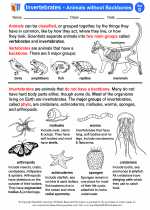 Invertebrates - Animals without Backbones
Invertebrates - Animals without Backbones  Worksheet/Answer key
Worksheet/Answer key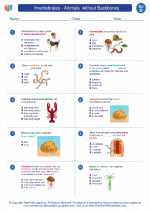 Invertebrates - Animals without Backbones
Invertebrates - Animals without Backbones  Worksheet/Answer key
Worksheet/Answer key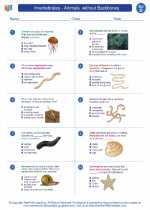 Invertebrates - Animals without Backbones
Invertebrates - Animals without Backbones  Worksheet/Answer key
Worksheet/Answer key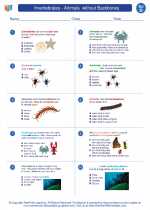 Invertebrates - Animals without Backbones
Invertebrates - Animals without Backbones  Worksheet/Answer key
Worksheet/Answer key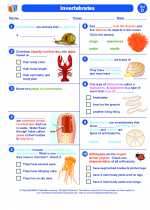 Invertebrates
Invertebrates  Vocabulary/Answer key
Vocabulary/Answer key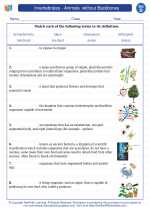 Invertebrates - Animals without Backbones
Invertebrates - Animals without Backbones  Vocabulary/Answer key
Vocabulary/Answer key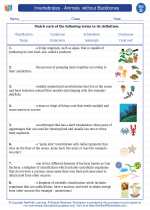 Invertebrates - Animals without Backbones
Invertebrates - Animals without Backbones  Vocabulary/Answer key
Vocabulary/Answer key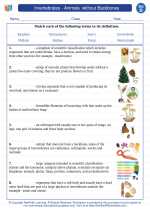 Invertebrates - Animals without Backbones
Invertebrates - Animals without Backbones  Vocabulary/Answer key
Vocabulary/Answer key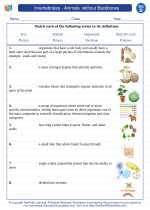 Invertebrates - Animals without Backbones
Invertebrates - Animals without Backbones  Vocabulary/Answer key
Vocabulary/Answer key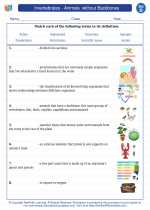 Invertebrates - Animals without Backbones
Invertebrates - Animals without Backbones 

 Activity Lesson
Activity Lesson
 Worksheet/Answer key
Worksheet/Answer key
 Worksheet/Answer key
Worksheet/Answer key
 Worksheet/Answer key
Worksheet/Answer key
 Worksheet/Answer key
Worksheet/Answer key
 Vocabulary/Answer key
Vocabulary/Answer key
 Vocabulary/Answer key
Vocabulary/Answer key
 Vocabulary/Answer key
Vocabulary/Answer key
 Vocabulary/Answer key
Vocabulary/Answer key
 Vocabulary/Answer key
Vocabulary/Answer key

The resources above cover the following skills:
Life Science: The students will use scientific skills and processes to explain the dynamic nature of living things, their interactions, and the results from the interactions that occur over time.
Diversity of Life: Explain how animals and plants can be grouped according to observable features.
Classify a variety of animals and plants according to their observable features and provide reasons for placing them into different groups.